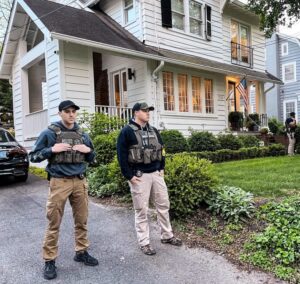Deciding cases and writing decisions is the easy part, especially if you’re a partisan hack.
The tough part is living with the notoriety. If being a SCOTUS justice has perks, there’s also a downside: You’re famous, and your critics know where you live.
 This is Justice Kavanaugh’s house. A lot of people didn’t want him confirmed for a seat on the court. Some called him a “rapist.” His vote to overturn Roe v. Wade doesn’t sit well with millions of women. And every day, a dozen or so are picketing his house.
This is Justice Kavanaugh’s house. A lot of people didn’t want him confirmed for a seat on the court. Some called him a “rapist.” His vote to overturn Roe v. Wade doesn’t sit well with millions of women. And every day, a dozen or so are picketing his house.
So, he leaves for work in the morning with U.S. marshals guarding his driveway. The marshals are there in the evening when he returns home from work. They’re there through the dinner hour, and in the evening while his children are trying to do their homework.
Kavanaugh has publicly complained that his notoriety is hard on his children (see story here). I’m almost tempted to feel sorry for him, and them, but nobody made him take this job.
An NBC News reporter who watched the protesters described them as “orderly” (see story here). Republicans, never fans of dissent (except violently storming the Capitol to overturn a presidential election), want them prosecuted under a 1950s-era law of questionable constitutionality (same link).
They allude to “mob rule,” but an orderly protest that breaks no laws by definition is not a “mob.” To borrow a Republican phrase, they’re “tourists.”
The local police told NBC News the picketers “have been following the laws.” They don’t go on Kavanaugh’s property; they stay on the public sidewalk.
The law indignant Republicans claim they’re violating prohibits “picketing and parading” with the intent of interfering or obstructing the administration of justice, or influencing a judge, but the protesters claim they’re only expressing their frustration over a decision already made.
Legal experts doubt they could be prosecuted for that, even if the law is valid, and argue the law itself collides with the First Amendment free speech clause.
Personally, I think politics should stay in political venues. Therefore, I’m against picketing political figures at restaurants, golf course, or their homes. Even people you disagree with have a right to peace in their private lives.
But I’m also against the proliferation of guns in American society, which the Supreme Court has facilitated with rulings striking down nearly every effort to regulate guns on the shaky grounds that private ownership of guns is a protected right. Well, dissent is a protected right, too.
It takes insane hypocrisy to argue private citizens are entitled to possess weapons designed for war, but shouldn’t be allowed to express their opinions on a public sidewalk in front of a Supreme Court justice’s home who votes that gun owners are free while women are not.
Regardless of whether those are legal rights, or not, I think people should refrain from both.